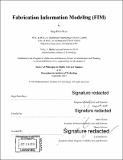Fabrication Information Modeling (FIM)
Author(s)
Duro Royo, Jorge.
Download1142630940-MIT.pdf (35.88Mb)
Alternative title
FIM
Other Contributors
Program in Media Arts and Sciences (Massachusetts Institute of Technology)
Advisor
Neri Oxman.
Terms of use
Metadata
Show full item recordAbstract
This thesis discusses novel strategies to include physical media information at multiple dimensions and relating to diverse disciplines within traditional design tools. Specifically, it addresses challenges that arise when aiming at describing computational and manufacturing strategies for material-, time- and scale-dependent phenomena. Fabrication Information Modeling (FIM) develops design processes and exemplar projects able to operate across media, disciplines, and scales, incorporating concepts of multidimensionality, media-informed computation, and trans-disciplinary data integration. Digital fabrication is today a rapidly evolving concept transitioning from traditional assembly of differentiated parts, to file-to-fabrication construction efforts, and even towards guidance of material synthesis on-the-fly and growth of biological agents into structures. Advances in the fields of materials engineering, robotic automation, artificial intelligence, and synthetic biology open up opportunities for incorporating new physical world information, from organism, material, machine, and environment, within and throughout digital design and manufacturing processes. With FIM and FIM-driven projects I aim to contribute to the field of digital design and fabrication by enabling feedback workflows where (1) materials are designed rather than selected; where (2) the question of how information is passed across spatiotemporal scales is central to design generation itself; where (3) modeling at each level of resolution and representation relates traditionally-unlinked methods and is carried out by myriad media; and finally, where (4) virtual and physical considerations coexist as equals.
Description
Thesis: Ph. D., Massachusetts Institute of Technology, School of Architecture and Planning, Program in Media Arts and Sciences, 2019 Cataloged from PDF version of thesis. Includes bibliographical references (pages 188-200).
Date issued
2019Department
Program in Media Arts and Sciences (Massachusetts Institute of Technology)Publisher
Massachusetts Institute of Technology
Keywords
Program in Media Arts and Sciences